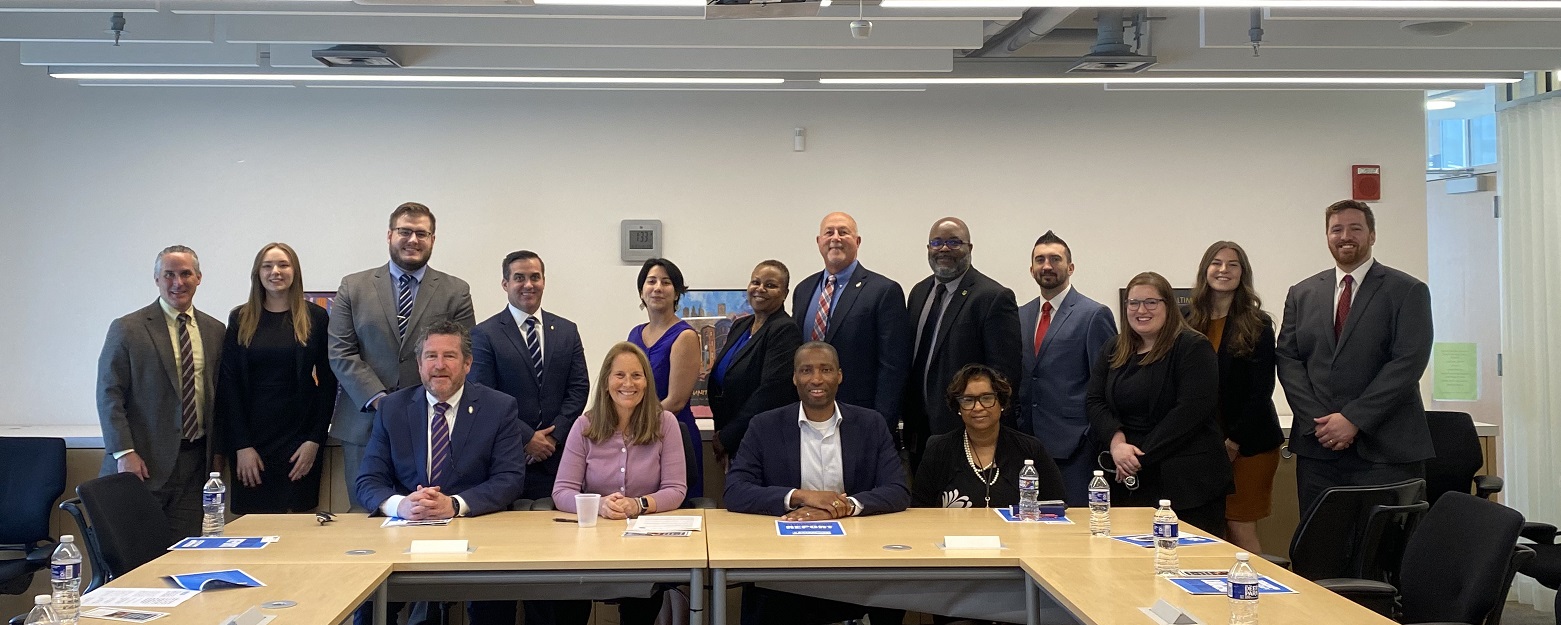Faculty: Professors Hugh B. McClean and Ashlyn Anderson-Keelin

Back row, left to right, Prof. Hugh McClean, Emily Kamp, Matthew Pipkin, Hon. Geoffrey Hengerer, Angela Guarino, Annie Harvey, Maryland Commissioner of Correction Phil Morgan, Anthony Gaskins, Jay Metzbower, Samantha Stephey, Marissa Ingram, Andrew Saah. Front row, left to right, Chief Judge John Morrissey, Hon. Halee Weinstein, Secretary Anthony Woods, Secretary Carolyn Scruggs.
Individuals who have served in the Armed Forces make up about 7% of over 2 million people incarcerated in the U.S. Most Veterans are honorably
discharged from service. But, for some, traumatic experiences in service have a profound impact on their lives. This, coupled with lack of support, can lead to substance use disorder, other mental illness, and incarceration.
The criminal justice system has found ways to respond to this issue. One response is the implementation of Veterans Pods. These Pods have provien to be successful across the country. Veterans Pods can be implemented in Maryland prisons to help those who have served our country.
Students at the University of Baltimore Bob Parsons Veterans Advocacy Clinic created this Report by compiling data from studies on Veterans Pods. This Report focuses on the potential implementation of the Veterans Pods in Maryland.
Watch "A Focus on The Bob Parsons Veterans Advocacy Clinic."
Watch The Bob Parsons Veterans Advocacy Clinic video: "A Centerpiece of the Community."
Watch The Bob Parsons Veterans Center video: "Our Job is Helping Vets."
Students enrolled in The Bob Parsons Veterans Advocacy Clinic represent veterans before courts and administrative agencies in diverse civil and veterans benefits matters. Students also engage in community education, legislative projects and other systemic efforts at law reform. Under the supervision of a faculty member, students are responsible for all aspects of representing clients, including interviewing clients and witnesses, counseling clients, engaging in fact investigation and discovery, drafting documents, negotiating with adversaries, and conducting hearings and trials. Students are expected to devote approximately 20 hours per week to clinic activity, including a three-hour weekly seminar component.
The Bob Parsons Veterans Advocacy Clinic selects cases for their educational and community service value, and students handle a diverse caseload during the semester. Students practice before the U.S. Court of Appeals for Veterans Claims, the Board of Veterans Appeals and the Department of Veterans Affairs (VA) regional offices. Practice areas may include disability compensation and pension claims, discharge upgrades, medical and physical evaluation boards, Servicemembers Civil Relief Act, fully developed claims and veterans treatment courts.
Prerequisite: First-year day courses
Co- or prerequisite: Professional Responsibility
Policies and procedures:
The Bob Parsons Veterans Advocacy Clinic selects its students through the lottery process.

